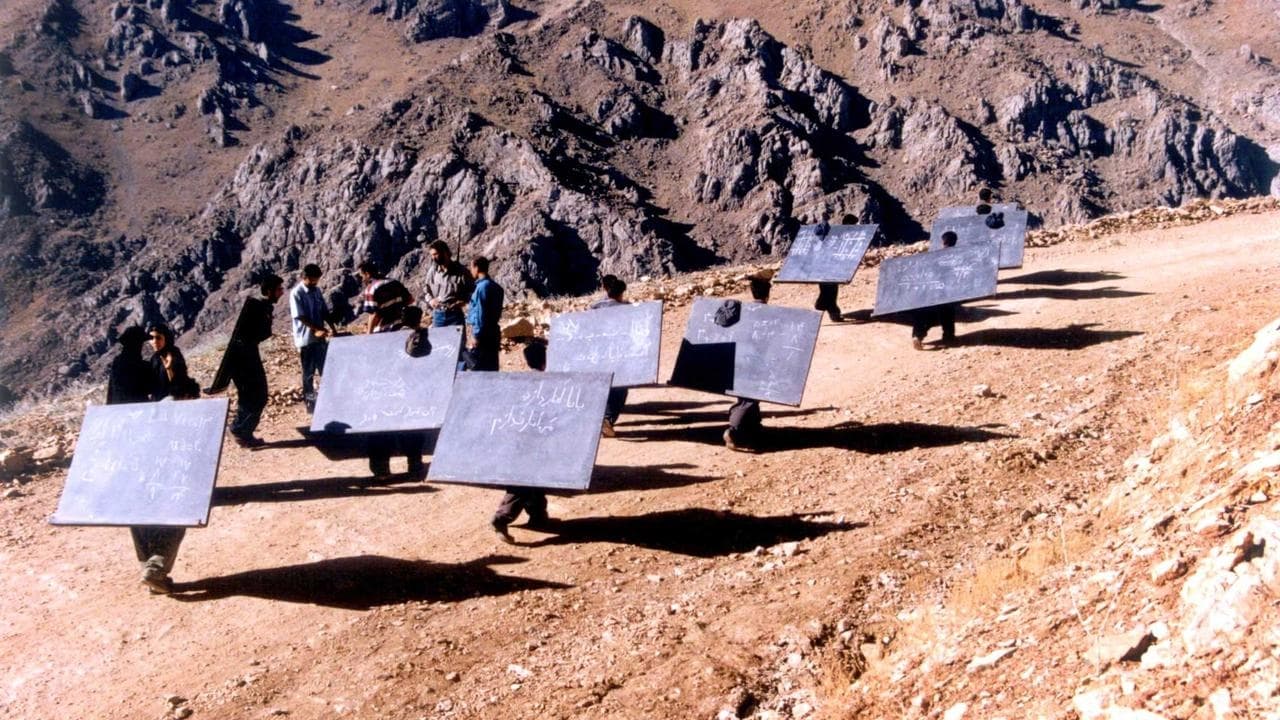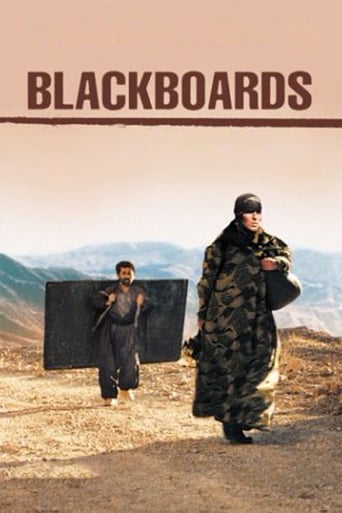

Firstly, for all those who say that this DVD is expensive, do as I did - rent it from your local lending library. £1.80 for a week, less cos I got it as a 3 for 2 on a Friday. You'd be surprised what World cinema gems (at least mine) they stock, mostly ignored by the rest of the population as they sit there from week to week.'Blackboards' reminded me SO much of another story of Iranian children being mules for contraband and risking life and limb to sell them in bordering Iraq - the uniquely titled 'A Time for Drunken Horses'. That remains one of the most beguiling and humbling movies ever made and remains a definite favourite of mine.Some (well, let's be honest, most) scenes portraying the out-of-work schoolteacher, traipsing around the arid mountains looking for pupils to teach and how he gets married with his only tool of the trade being the barter, are eye-opening. Unbelievable, actually but as the amateur cast are obviously not acting this out for fun and the very seriousness of their plight, this is all very far from being a joke.The honesty of it all makes one humble simply to be alive, let alone being alive in our comparatively comfortable West. Like I said in my 'Drunken Horses...' review, one to show your children when they start moaning that their expensive trainers are the wrong colour.I don't think that the details of the plot are needed here. It's a short film and a lot happens, but slowly - and naturally. But, I will say that you'll never have seen so many uses for a board that's painted black in your life before.This is essential, but minor Iranian cinema. If you do come across it, either on TV or whatever source you can, make time for it. It's unforgettable.
... View MoreThis film promised to be a real sleeper. I am a teacher and knew I'd enjoy a movie about traveling teachers who carry blackboards on their backs. But the teachers split up and of the ten or so that start out, the camera picks the worst example of a teacher to follow. You don't realize this at first--you see him laboriously searching students with an interest in reading. What he finds is a group of child smugglers or mules and an exodus of old folks returning to Iraq. None have the inclination to learn to read even if the lessons are free. They're too busy and too tired. But Said, the teacher we're following, doesn't hear a word they say. The audience is in awe at the all-work lifestyle of these kids who only want to survive. Said keeps asking them if they want to read clearly not even hearing their responses.Later he marries as a favor to a stranger whose friend is old and wants to see his daughter married off. Said promptly starts to teach her to read ignoring the fact that she could care less. He sends the kid off so he can pepper her with letters of the alphabet that she simply ignores. Later, his stepson runs off and the wife heads down the road in pursuit. Said thinks she's deserting him. He never does get why she went down the road or why she finally stops. She's found the kid but Said is clueless as to what has just happened. So he divorces her for being weird.He was the worst ambassador for being literate that I've ever seen. In spite of him I was moved by the poverty, the hard dry terrain, and by the bravery and loyalty of the people who marched all day seemingly without food or water.
... View MoreNot a bad effort for a 20 - year old, even when considering that her father is a (locally) famous director, though I would question that it warranted the attention it got here in France. The film starts off with very memorable images of a band of teachers wandering through the rough terrain of the Iranian borderland, in search of prospective pupils, with their blackboards tied to their backs. A great starting point for the film, but unfortunately from there on it increasingly meanders through the plot, stretching some plot elements beyond the tolerance of even a forgiving "alternative cinema" audience -- half as long would probably have meant twice as good. Still, I haven't seen many movies from this part of the world, or made in this style, so overall it made for a good cinematic experience.
... View More'Blackboards' is one of those films that has divided audiences between fanatical admirers and grumbling dissenters. The former admire the director's skilful juggling between formalism and humanism, individual quests and social movements, private moments and public set-pieces; her filming of landscape; her eliciting of unsentimental, compelling performances from an amateur cast; her insistence on enigma and loose ends; her portrait of life in extreme, harrowing conditions. The dissenters bemoan her fudging of politics - sure, she shows the exploitation of children, the mass displacement of the Kurds, and the murderous terror lurking behind every rock, but by refusing to put these in a contextual framework, such depictions are blunted in political force.there is a whiff of misogyny to me in these complaints. It's okay for men to make ambitious, universalising statements, but women must remain concerned with the local. Presumably Makhmalbaf would have been more political if she had concentrated on authenticating the patterns on the women's dresses. Of course, culture in general has moved towards the local: with post-modernism, very few artists have had the confidence to think on a large scale (I don't mean make large-scale films, which any fule kan do).This is presumably why 'Blackboards' reminds me of older types of artists. Most immediately, it could be a massive Beckett play, full of wandering vagrants in a vast, desolate landscape, peopled with Lucky-like slaves, surrounded by an unseen, God-like menace, occasionally erupting in capricious violence. Like Beckett, there is no real beginning or end, no context, just a sense of never-ending repetition with the only possible relief in death.Like Beckett (eg 'Waiting for Godot'), culture has no place in such an environment, indeed, seems a grotesque irrelevance, an incomprehensible babble, traces scraped in a landscape no-one can read now, never mind in the future. And yes, the film is as unremittingly hopeless as a Beckett play - there is no progress or redemption here. But it is as bleakly funny too - eg the whole marriage farrago between Said and Hahaleh; the game of marbles watched by her son; the tragicomic, very Beckettian inability of her aged father to relieve himself.In the film world, 'Blackboards' reminds me of no-one so much as Angelopolous, especially in a film like 'The Travelling players', where a group of itinerant outsiders observe and become absorbed in an unfamiliar community. Makhmalbaf has Angelopolous' confidence in allegory, a way of dramatising in mythic form life and displacement under a totalitarian regime, without in any way 'abstracting' the violence and pain.The empty landscapes suddenly being inexplicably over-run by faceless crowds also has the millenarial feel of Andersen's recent 'Songs from the second floor', or later Bunuel, from whom the theme of the journey, coming across strange, surreal strangers (eg the uncanny scene with the masked gardener whose son languishes in an Iraqi jail), or images such as the blackboard-hauling men like grounded birds watching blackbirds in the sky, and overhearing another, ominous, unseen flying object, derives. There are many, many ways of being political.Unlike these masters, however, who prefer irony and distant tableaux, Makhmalbaf, through restless handheld camerawork, gets right in between her characters and makes us feel for them.
... View More